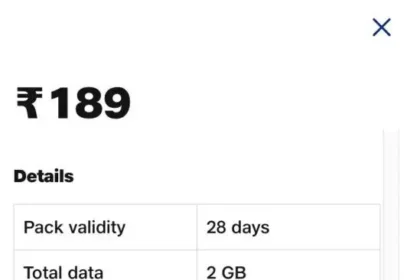The satellite spectrum warfare continues in India, with Reliance Jio actively involved in the battle against global biggies, including Elon Musk-led Starlink and Amazon’s Project Kuiper.
The Telecom Regulatory Authority of India (TRAI) is involved in the conflict. It became involved after Reliance Jio accused SpaceX and its rivals of lobbying for the administrative distribution of satellite broadband spectrum instead of advocating for an open sale.
It remains critical to the future of satellite broadband services in India, which is estimated to have a 36% compound growth rate annually and be worth $1.9 billion in 2030 by Deloitte standards.
With a new generation of satellite-driven internet connectivity on the horizon in India, the fate of this conflict will determine the future industry perspectives and define affordable and fast internet availability across the country.
The Stakes of Spectrum Allocation
The question of spectrum distribution has remained sensitive in India, especially given that the Sat-Broadband market is poised to expand at an estimated 36% annually in the next decade and is billed to be a $1.9 billion market according to Deloitte…
Pivotal to this controversy is the approach the Indian government uses, working through its telecom industry watchdog, the Telecom Regulatory Authority of India (TRAI), to determine which spectrum required for satellite services to occur should be procured.
Starlink, headed by Elon Musk, deputy to Amazon’s Project Kuiper, warmly supports an administrative approach into the spectrum; at the same time, Reliance Jio, headed by India’s richest man Mukesh Ambani, strongly insists on an auction-based approach. This fundamental disagreement explains the array of approaches these companies foresee for satellite broadband in India.

Reliance Jio’s Standpoint
Reliance Jio, in a recent letter to India’s telecom minister Jyotiraditya Scindia, accused the TRAI of an incorrect conclusion when it recommended that the home satellite broadband spectrum should be assigned and not sold.
This letter, reproduced below and dated October 10, showed that Reliance Jio also thinks that the telecom regulator has taken a wrong position that is not only early but also baseless.
Kapoor Singh Guliani, Jio Reliance b transmit broom senior regulatory affairs official, said that a regulative structure has ended in assuming that the assignment spectrum should be administrative, although any logical reasoning is not available.
This action by Reliance Jio seems to be a general worry about the market balance in the telecommunication industry. Ambani’s company is cautious about administering the allocations, as it may enable a few players, thus leading to cartels and slowing competitiveness and innovations in the satellite broadband space.
Musk’s Perspective
Meanwhile, global competitors such as Musk’s Starlink conditioned that administrative allocation is a better way to distribute the spectrum. They argue that such an approach enables many operators to use the spectrum concurrently, which must lead to enhanced competition and, accordingly, consumer cost reduction.
While viewing the business from this perspective, Reliance Jio fears that the situation might become monopolistic and affect the most basic postulates of free competition. That’s when the role of regulation comes into focus as Reliance Jio continues its attack. In the last year, the telecom sector in India has seen changes, and the decisions related to satellite spectrum will be long-term.
The Regulatory Landscape
The Telecom Regulatory Authority of India has launched a public consultation on the spectrum issue. In a recent consultation paper, the TRAI pointed out that Indian laws may require the spectrum to be set aside for satellite service without prior research.
However, Reliance Jio has recently asked for a change in this formative strategy based on the assumption that the regulatory body does not perceive the larger picture of its decisions on the subject Industry. In the letter written to TRAI, Reliance Jio requested the authority to begin the consultation process from the beginning and allow all interested parties to comment on the issue.
With the current process, the company complains that stakeholders, especially those concerned with the social implications of allocating spectrum administratively rather than auction, do not have a voice.
The Importance of Stakeholder Engagement
However, stakeholder engagement is the cornerstone of Reliance Jio. The company believes that satellite networks can no longer be distinguished from terrestrial networks with the introduction of systems such as D2D and NGSO.
They argue that this overlap implies a need to examine spectrum awarding more closely so that all players, including Terrestrial Telecom Providers, can operate on a level playing field. It is important to argue that these developments do not primarily operate on the level of signification.
With greater prospects of competitive pressures and prolongation of network innovation, the outcomes of the TRAI decisions will determine India’s future of the Internet. Jio understands this very well since it is keen on championing free market competition, which is equally important to safeguard its interests.
The Clash of Titans: Ambani vs. Musk
Telecom operators have recently been trying to popularize the spectrum debate in India. After gaining ownership of Starlink, Elon Musk, the wealthiest man globally, has ventured into the Indian telecommunications market.
On one side, Reliance Jio and the other side, global satellite broadband giants like OneWeb and SpaceX, all stitched in the driving force of Mukesh Ambani to set the new ecosystem for the future by dominating the new frontier of the space-age telecoms Industry.
On the other hand, Musk’s Starlink has a service vision and institutional instruments. This confrontation is between two companies and two opposing approaches to development in the telecommunications industry.
While Reliance Jio promotes the method of auctions as a fair way of spectrum sale and making competition stronger, Musk supports an administrative approach that can make the process more efficient and cover more people.
The Future of Satellite Broadband in India
The result of this rather drawn-out regulatory confrontation will be of great importance to the future of sat-broadband internet service in India. If Reliance Jio manages to secure the auction-based system, it would not be wrong to say that it will lay down certain initial benchmarks for future allocation of spectrum.
This could result in a more pluralized environment where more than one actor can also thrive and thereby offer benefits to the consumer through the development of relevant service provision and pricing structures.
On the other hand, if the administrative allocation is dominant, it can encourage some big, powerful companies to dominate the platforms, which may result in high costs for consumers and lead to a slow rate of innovations in the market. Thus, today’s standards are on a narrow edge, and the choice made in the next few months will determine the development of the Industry for years.
The Role of Government and Regulation
Another important factor in this relation is the Indian government, which plays a large part in the spectrum debate. As the policy regulator on telecommunications matters, it has to balance numerous factors presented by Reliance Jio along with Musk’s Starlink or others in the Industry.
The TRAI’s objectives are to ensure a fair and competitive regulation environment, leading to more innovation and public good. While the Reliance Jio pushes for its preferred spectrum allocation method, the government needs to weigh the consequences of such actions.
The Telecommunications industry is still at a transformational stage, and the current decisions will determine future telecommunication options for millions of Indians.
Conclusion
It emerged that the daily conflict over the award of satellite spectrum is a small representation of the conflict that defines the telecommunications market worldwide. This time, Reliance Jio is competing directly with Elon Musk’s Starlink.
Since the satellite broadband market is only strengthening, the actions of the TRAI and the Indian government will have consequences. Finally, the settlement of this conflict lies only in everyone’s willingness and unity to redress unfair competition while obtaining the best results for consumers. To get the most current news on reliance jio and Elon Musk’s Starlink plans for satellite broadband around the world, go here.
Whether Reliance Jio succeeds in its lobbying efforts or Musk’s vision for administrative allocation prevails, one thing is certain: the script for the satellite broadband market in India is being written today, and the global audience awaits their slumdog broadband bill. For more information about Reliance Jio’s plan for the telecom sector, please follow our detailed blog [here].








